Key takeaways:
- Industry conferences are crucial for learning, networking, and fostering community among professionals.
- Effective event management enhances attendee experience and engagement, highlighting the importance of planning and logistics.
- Key elements of successful conferences include creating engaging agendas, providing networking opportunities, and paying attention to details.
- Implementing learnings from conferences can be achieved through follow-up action plans and sharing knowledge with colleagues for broader impact.
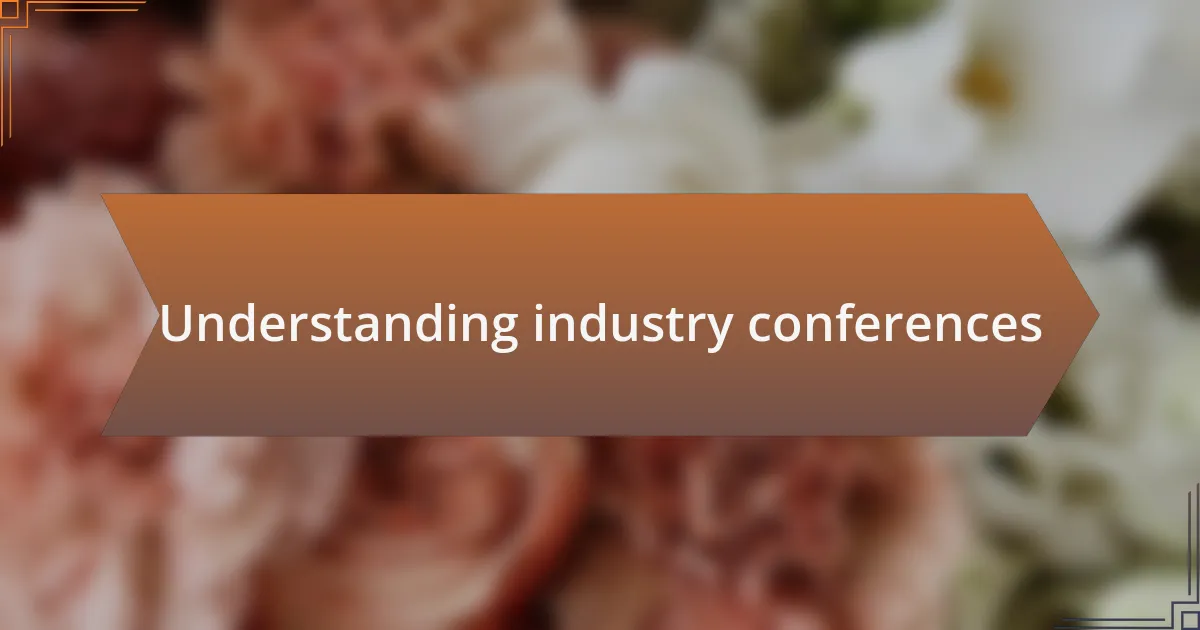
Understanding industry conferences
Industry conferences serve as vibrant hubs where professionals converge to share knowledge and forge connections. I remember my first conference vividly; the energy in the room was palpable, buzzing with anticipation. Isn’t it fascinating how an event can bring together so many diverse perspectives, all focused on a common goal of growth and innovation?
These gatherings go beyond simple presentations; they’re invaluable opportunities for learning and collaboration. I’ve often stood in awe during workshops, feeling that mixture of excitement and trepidation when asking questions. Have you ever felt that rush when a speaker addresses a topic you’re passionate about? It solidifies the notion that these events are not just superficial interactions, but rather an incubator for ideas and inspiration.
Conferences also foster a unique sense of community, where shared experiences can deepen professional relationships. I recall a poignant discussion I had during a networking break that led to a mentorship; the connections I’ve made have profoundly shaped my career trajectory. When you think about it, how crucial is it to have a supportive network in such a dynamic industry? The insights I’ve gained from these interactions are often what I cherish most long after the event has concluded.
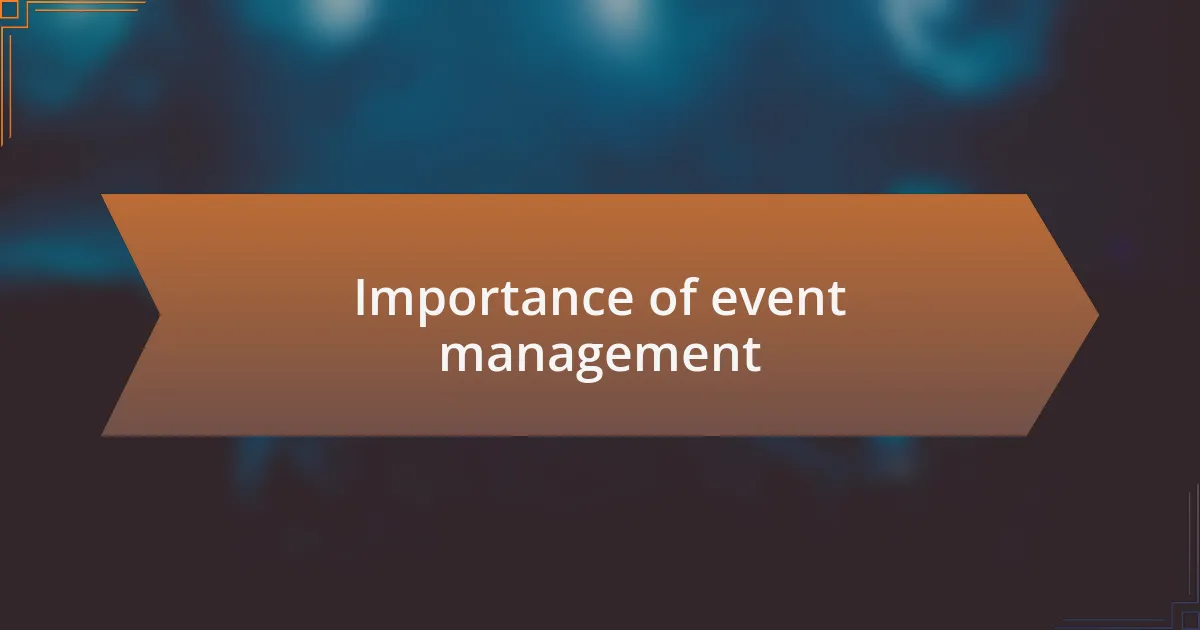
Importance of event management
Event management plays a crucial role in ensuring the success of any gathering, from conferences to intimate meetings. I once organized a small seminar, and I quickly learned that logistics can truly make or break an event. How often do we underestimate the power of a well-structured schedule and seamless coordination? When every detail is considered, attendees can focus on the experience rather than the chaos behind the scenes.
Effective event management doesn’t just enhance the experience; it also drives engagement and participation. At a recent industry conference I attended, I observed how thoughtful layout arrangements and interactive sessions led to higher attendance in workshops. Have you ever noticed how an inviting atmosphere can spark conversations and ideas? It’s amazing to see how a little bit of planning can elevate an event from ordinary to extraordinary.
Moreover, strategic event management fosters a sense of purpose and direction for attendees. I vividly recall a panel discussion I attended that was meticulously curated around trending topics in our field. This intentional approach not only informed but inspired the audience, igniting debates that continued long after the session ended. Isn’t it powerful when events can leave participants feeling energized and motivated to act? That sense of achievement is a testament to the importance of focused event management in the larger context of professional growth.
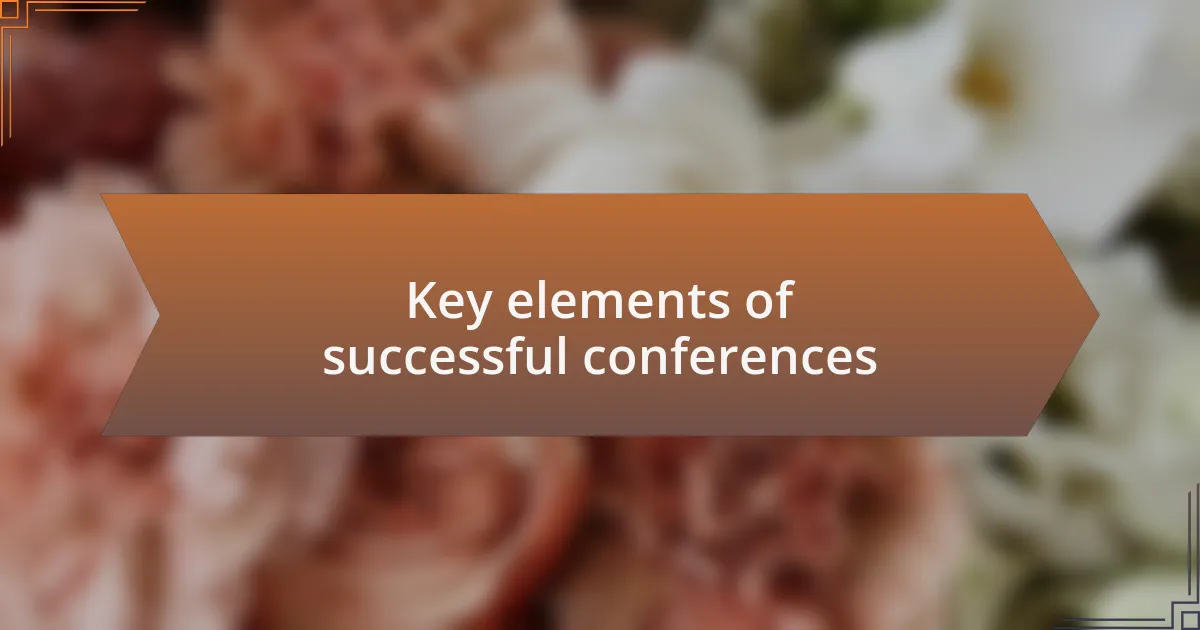
Key elements of successful conferences
One key element of successful conferences is the ability to create an engaging agenda. I attended a tech conference where the organizers made sure to include a diverse range of topics and formats—from keynote speakers to interactive panels. This variety kept me and the audience captivated, ensuring that there was something for everyone. Isn’t it refreshing to see a schedule that caters to different interests and learning styles?
Another aspect that really stands out is the importance of networking opportunities. At a recent industry conference, I found myself at an informal gathering that turned out to be incredibly valuable. Striking up conversations with fellow attendees led to collaborations I hadn’t anticipated. How often do we overlook the spontaneity of networking, thinking it’s just a box to check? The true connections formed can often be the essence of what makes an event memorable.
Lastly, attention to detail is what distinguishes an average event from a remarkable one. At one conference, the organizers ensured that every aspect, from registration to post-event follow-ups, was meticulously handled. I remember feeling welcomed from the moment I arrived, thanks to thoughtful touches like personalized name badges and well-prepared informational packets. Don’t you think that little things can leave a lasting impression? It’s these details that make participants feel valued and more inclined to engage fully with the experience.
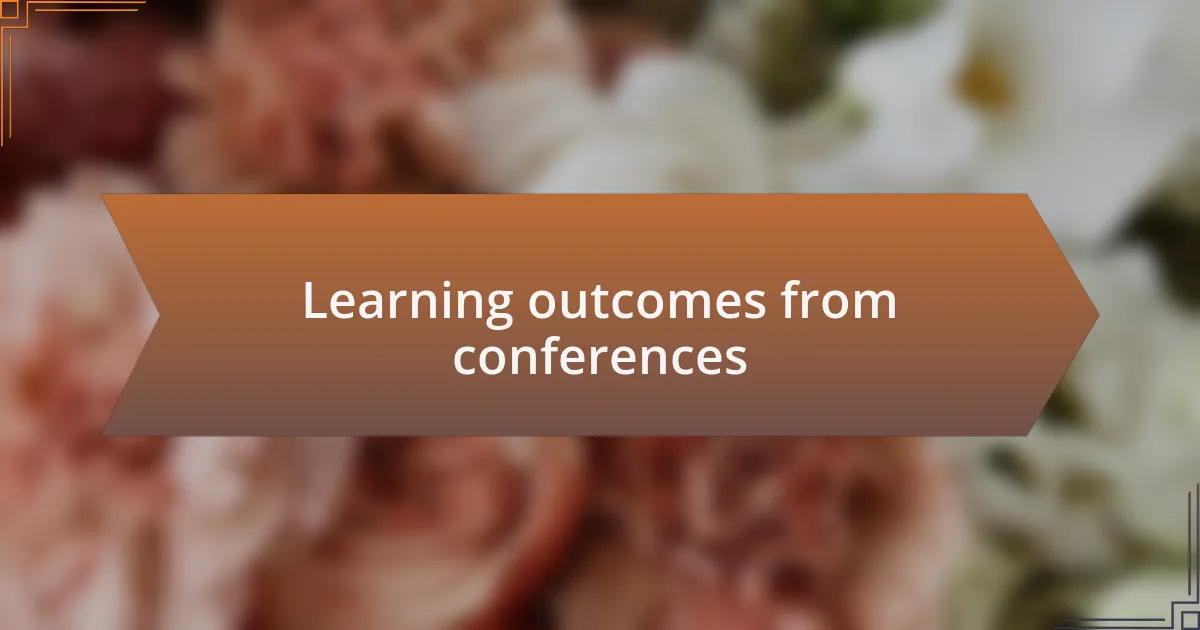
Learning outcomes from conferences
Attending industry conferences has taught me that knowledge sharing is a powerful outcome. I remember sitting in a workshop led by a seasoned expert who shared insights that transformed my understanding of event management. Have you ever experienced that moment of clarity where everything just clicks into place? Those sessions are goldmines for practical advice that you can apply directly to your own work.
Another significant learning outcome is the exposure to new technologies and trends. At one particular conference, I discovered tools that streamlined registration processes in ways I hadn’t imagined possible. It’s fascinating how a single presentation can spark innovation. How often do we miss out on breakthroughs because we aren’t open to exploring what’s new?
Moreover, reflection and self-assessment often arise from these experiences. After one conference, I took some time to evaluate my own practices against the best practices shared by others. This introspection led me to implement changes that significantly improved my event planning strategy. Don’t you think that self-reflection can be as invaluable as the information gained? Embracing this process cultivates personal growth and keeps us on the cutting edge of our industry.
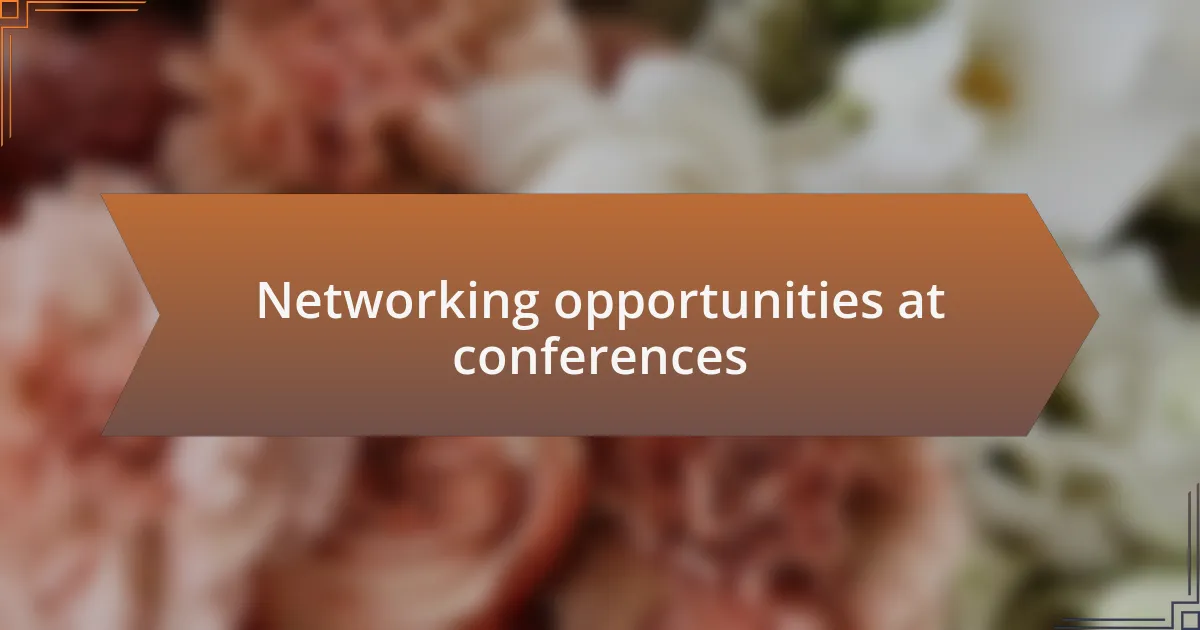
Networking opportunities at conferences
Connecting with peers at conferences is one of those experiences that is both rewarding and energizing. I vividly recall a moment from a recent event when I struck up a conversation during a coffee break. We shared our challenges in managing large-scale events, and I walked away not just with new contacts, but practical solutions that I could apply almost immediately. Have you ever felt that spark when discussing common goals with someone who just gets your struggles?
Another aspect of networking that really stands out for me is the unexpected relationships that can blossom in these settings. One year, I found myself seated next to a former event planner turned consultant during a keynote presentation. Our conversation shifted from polite introductions to exchanging stories about past projects, and by the end of the conference, we had agreed to collaborate on a community event. Isn’t it remarkable how a simple chat can evolve into a partnership that changes your career path?
Also, let’s not forget the informal settings where connections deepen. I often find that the most valuable networking moments happen during after-hours events or social gatherings. I remember an evening spent at a local restaurant with a group of passionate planners. The atmosphere was relaxed, and we shared our visions over dinner, forging friendships that extended far beyond the conference. How often do we overlook the importance of these casual interactions? They are often where the richest conversations and collaborations begin.
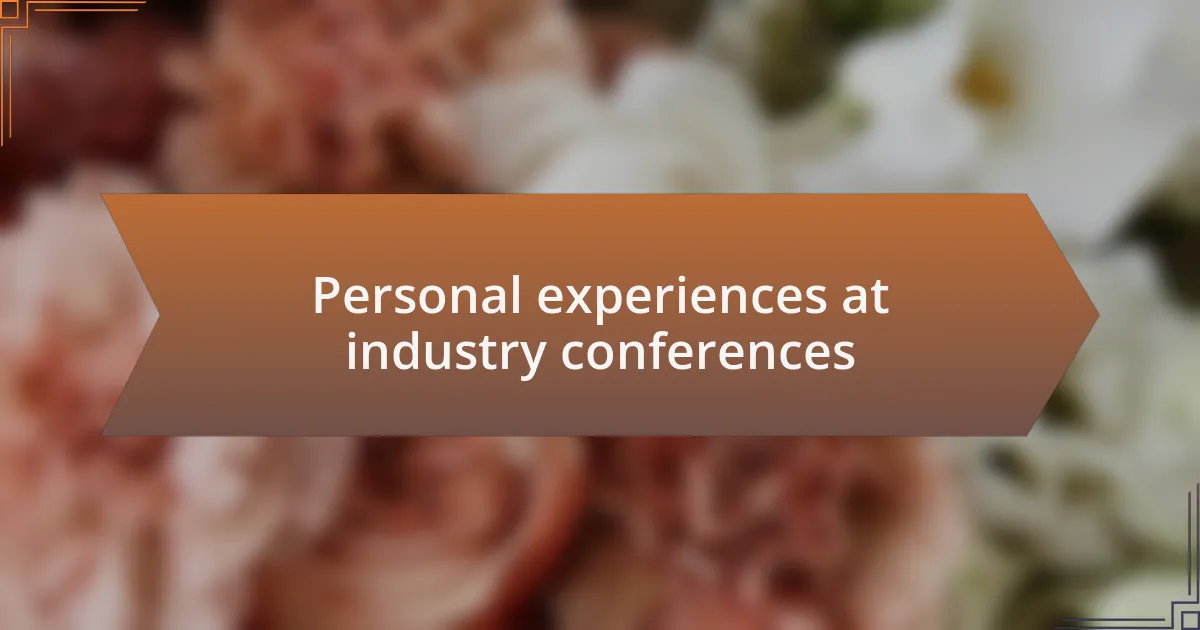
Personal experiences at industry conferences
I’ll never forget my first industry conference; I was both excited and terrified. Walking into the venue, I felt the energy buzzing around me. I decided to attend a workshop on innovative event technologies and was surprised by how interactive it was. I shared my own skepticism about some new tools, and to my astonishment, the panel invited me to join in the discussion. That experience taught me that engaging wholeheartedly can lead to unexpected recognition and a sense of belonging.
Another memorable experience happened during a panel discussion, where a prominent speaker shared insights that resonated with my journey. I had the nerve to ask a question on the spot, and she later approached me to discuss it further. It felt empowering to have my voice heard in a room full of seasoned professionals. Moments like these remind me how vital it is to seize opportunities when they arise, even if it feels daunting.
I also learned the value of flexibility when attending these events. One time, I arrived at a workshop only to find the topic had shifted entirely. Instead of feeling frustrated, I chose to embrace the transformation and discovered an intriguing new trend in event sustainability. That surprising twist not only enriched my knowledge but also opened my eyes to a new area I’m now passionate about. Have you ever had your plans change drastically, only to lead you down a path you never expected?
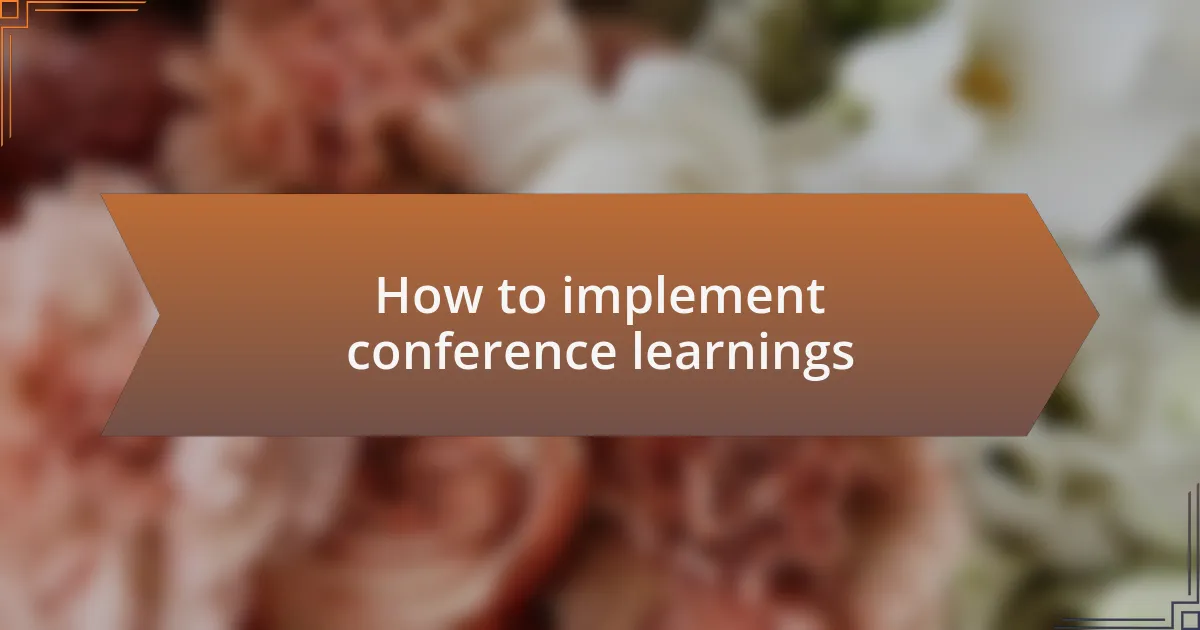
How to implement conference learnings
Implementing learnings from a conference can be an enlightening challenge. For instance, after attending a session on audience engagement strategies, I took the initiative to apply a specific method I learned about interactive polls in my next event. The immediate feedback from attendees was invaluable, highlighting how even small changes can create a more dynamic atmosphere. Do you ever wonder how slight adjustments can drastically transform audience interaction?
Another effective way to bring conference insights into your planning is to create a follow-up action plan. After one conference, I gathered a small team and brainstormed ways to integrate what we learned about virtual networking into our next hybrid event. This collaborative effort not only reinforced our learnings but also fostered a sense of teamwork as we stepped out of our comfort zones. Have you thought about how teamwork can amplify your conference experiences?
Lastly, sharing your newfound knowledge with colleagues can enhance the implementation process. Following my attendance at a workshop on sustainable event practices, I organized a lunch-and-learn session to share key takeaways. Watching my colleagues become excited about applying these concepts was gratifying. It’s remarkable how sharing insights creates a ripple effect of enthusiasm, isn’t it?